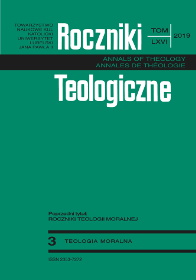Interpretative Horizon of so-called „Irregular Situations” (Amoris laetitia) in the Light of the Teaching of John Paul II and the Document of the International Theological Commission The Interpretation of Dogma
Abstract
This article is devoted to the issue of interpreting the teaching of Pope Francis on the so-called “Irregular situations” presented in the exhortation Amoris laetitia. This is an important problem because this part of papal theology raises the most controversy. Looking at the dynamics of the development of the Church's doctrine, one can easily see its constant development towards the better clarification of the truths of faith as well as the constant updating of teaching. However, every updating must be immersed in Tradition because the truth remains unchanged in its essence, and only a certain language form of its message can change. Adopting the hermeneutics of continuity that characterizes the development of the Church's doctrine, it is entitled to search for the right hermeneutic context for “irregular situations” in the light of the theology and anthropology of John Paul II and against the background of the International Theological Commission document dedicated to the interpretation of dogmas.
References
Bartnik Cz. S., Dogmatyka katolicka, t. 2, Lublin 2010.
Buttiglione R., Przyjacielska odpowiedź krytykom „Amoris Laetitia”, tłum. M. Chojnacki, Kraków 2018.
Franciszek, Adhortacja „Amoris Laetitia”, Rzym 2016.
Jan Paweł II, Adhortacja „Christifideles laici”, Rzym 1988.
Jan Paweł II, Adhortacja „Ecclesia In Oceania”, Rzym 2001.
Jan Paweł II, Adhortacja „Familiaris consortio”, Rzym 1981.
Jan Paweł II, Adhortacja „Reconciliatio et paenitentia”, Rzym 1984.
Jan Paweł II, Encyklika „Dominum et Vivificantem”, Rzym 1986.
Jan Paweł II, Encyklika „Ecclesia de Eucharistia”, Rzym 2003.
Jan Paweł II, Encyklika „Veritatis splendor”, Rzym 1993.
Jan Paweł II, List do rodzin „Gratissimam sane”, Rzym 1994.
Jan Paweł II, Mężczyzną i niewiastą stworzył ich. Odkupienie ciała a sakramentalność małżeństwa, Lublin 2011.
May W.E., La `communio personarum' e l'atto coniugale, w: Morale Coniugale e Sacramento della Penitenza: Riflessioni sul Vademecum per i Confessori, red. A. Card, L. Trujillo, F.G. Hellin, Roma 1998, s. 135-150.
Międzynarodowa Komisja Teologiczna, Interpretacja dogmatów, Rzym 1988.
Müller G.L., Przedmowa. Dlaczego adhortacja „Amoris Laetitia” może i powinna być rozumiana w sensie ortodoksyjnym, w: R. Buttiglione, Przyjacielska odpowiedź krytykom „Amoris Laetitia”, tłum. M. Chojnacki, Kraków 2018, s. 5-28.
Pokrywka M., Rola Eucharystii w budowaniu małżeńskiej „communio personarum”, RT 52(2005), z. 3, s. 49-60.
Ratzinger J., List do biskupów Kościoła katolickiego na temat przyjmowania Komunii świętej przez wiernych rozwiedzionych żyjących w nowych związkach, Rzym 1994.
Ratzinger J., List do biskupów Kościoła katolickiego o niektórych aspektach Kościoła pojętego jako komunia „Communionis notio”, Rzym 1992.
Sobór Watykański II, Konstytucja duszpasterska o Kościele w świecie współczesnym „Gaudium et spes”, Rzym 1965.
Wojtyła K., Miłość i odpowiedzialność. Lublin 2001.
Copyright (c) 2019 Roczniki Teologiczne

This work is licensed under a Creative Commons Attribution-NonCommercial-NoDerivatives 4.0 International License.





